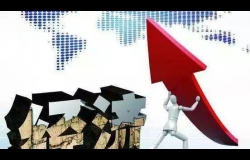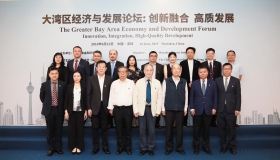Professors from CUHK-Shenzhen SME and SFI Proposed Suggestions to Minimize Economic Losses During Outbreak of Coronavirus

Prof. Wang Cong
Presidential Chair Professor of CUHK-Shenzhen
Associate Director of SFI
Director of the Center for Corporate Governance and Employee Ownership
The service industry that contributes to 54% of the GDP of China is hit seriously by the outbreak of coronavirus. Compared with SARS outbreak in 2003, the epidemic has a greater influence on China’s economy. The sectors affected by the coronavirus outbreak are mainly retailing, hotels, catering businesses, transportation, and the labor-intensive and middle- and- low-end manufacturing which postpones the resumption of work and production. At a micro level, the companies severely impacted by the coronavirus are those small and medium-sized companies with a high degree of operating leverage and financial leverage.
The operating leverage is a cost-accounting formula that the fixed costs account for a high percentage of the total costs. Rents and labor costs are the most important two items in the fixed costs. Therefore, it is suggested that the government takes measures to provide subsidies and reduce the costs of rents and labors for companies. To be more specific, measures include cutting the rents of government-owned properties for small and medium-sized companies and allowing the companies to negotiate with employees to reduce salaries and benefits during the pandemic are encouraged. On the other hand, it is advised that companies’ tax should be postponed to lessen their financial burden.
Financial leverage involves interest expenses produced by debts. For companies with a high degree of financial leverage, it is not suggested forcing financial institutions to lower interest rates. In such doing, the risks of the real economy will be transferred to banks, raising the risk of the financial system. Prof. Wang Cong gives his suggestions that the government sets certain funds to provide interests’ subsidies for small and medium-sized companies, which will lower the negative impact of the financial leverage on companies and avoid a higher risk of the financial system on the other hand.
Set-up of the buyout fund is proposed to encourage the companies in good conditions, and with abundant cash reserves, to conduct industry’s consolidation through mergers and acquisitions. As the economy is undergoing the downward pressure, it is a good time for companies in good conditions to conduct mergers and acquisitions. The government may set up buyout funds to encourage companies to take over the firms with good assets but suffering huge losses during the pandemic in the short term. This measure can reduce the economic losses caused by the coronavirus outbreak, in the meantime, the market can play an effective role in offsetting the risks brought by the economic downturn.
During this pandemic, the importance of the digitalization transformation for the development of companies becomes more obvious. It is suggested that special funds should be established to support the digitalization transformation of the small and medium-sized companies. For example, the government may subsidize those companies for their additional expenses.
All suggestions above mentioned need supports from the government. In 2020, the government shall bear huge financial pressure relatively and it shall scrimp and save. Shenzhen, as the pilot demonstration area of socialism with Chinese characteristics, the government has a responsibility to reduce unnecessary expenses (such as, cutting the scale and expense of the celebration activities for the 40th anniversary of the special economic zone). The savings can be used to support small and medium-sized companies, which will be a great example for other local governments. This measure not only builds itself a positive image but also presents the determination and vision of Shenzhen.

Wang Jian
Associate Dean (Academic) of SME
Director of the Center for Macro-Financial Stability and Innovation
Senior Research Economist and Advisor at the Federal Reserve Bank of Dallas
Eliminate people’s fear as soon as possible and resume work and production
Based on my study of the influence of consumer confidence and market fluctuations on the macro-economy, confidence and mood fluctuation are two important factors that cause the economy’s ups and downs. Moreover, the pessimism and the deterioration of the real economy interact mutually, and thus such a vicious circle will cause a long-term (2-5 years) slowdown of economic growth and productivity. At present, some institutions in China no longer cover up the number of infected cases and neglect their duties, but they still seek political safety through a series of overreactions. That also perform externally like Chinese people are banned from entering some countries and regions in the world. China needs to eliminate people’s fear interiorly so that to dispel misgivings from other countries and regions. The China’s economy was sluggish in the second half of the last year. The economic growth is likely to continue the slump if the confidence in China’s economy gets weakened again by this outbreak. Although our government makes great efforts in controlling the pandemic, Chinese people still complain about the unpromising performances of some officials and workers. If China’s economy collapses and mass layoffs occur, the social stability will be inevitably threatened.
Suggestions:
The resumption of production is suggested on condition that coronavirus situation is under control. Local governments need to consider how to weigh against the control of the coronavirus and economic costs. It is also suggested that the central government shall take the economic costs into the performance evaluation system of political achievement during this period. Currently, the policies of controlling the coronavirus by many local governments have great uncertainties. For example, these policies may be arbitrarily exaggerated and misunderstood. The research shows that this uncertainty during the implementing process will severely damage the economy. Local governments need to confirm and set united standards to get the economy back to normal, instead of extreme actions like lockdowns of people and transportations. Specifically, communities cannot randomly monitor resident’s entry and exit. Highways cannot be sealed-off neither. Public transportations shall be restarted as soon as possible. Short-term living and quarantine places shall be prepared for people to return to work.
It is proposed that medical resources shall be distributed and applied appropriately to eliminate people’s fear of the coronavirus. On one hand, the medical resources need to be integrated and applied in contagious patients with priorities. Once death rates are lowered, people’s fears will be eliminated greatly. On the other hand, the production of medical protective appliances needs to be accelerated, such as masks and disinfector. These are the necessities for people to restart work and social activities. Amartya Sen, professor from Harvard University, received Nobel Prize for the research on the policy of hunger relief. He found that most of deaths caused by hunger is not due to the shortage of food, but the lack of an effective mechanism of sending food to those who need it the most. At present, China is facing the similar problem during the outbreak. According to the data, the death rate of the novel coronavirus is not high (1-2%), approximate to that of flu, on the premise that medical help can be provided in time. However, due to the limitation of medical resources, contagious patients cannot receive treatments in time after the outbreak of the coronavirus. This is the reason that death rate of Wuhan is far higher than other areas. Especially, the suspension of public transport compounds the difficulty. For example, it is reported that the patient needs to walk for several hours to get to a hospital. Because of the panic, people with light symptoms tried to snap up medical resources through personal relationship, which has caused a big waste.
It is also proposed that information should be revealed immediately and transparently. Similar to the financial run caused by information asymmetry, the problem brought by information blackout in early stage triggers people’s over anxiety and irrational behaviors. Currently, local governments have made great improvements in this aspect. Based on that, the misinformation needs to be clarified in time by the authority, which can increase the efficiency and effectiveness to control the coronavirus. In the long term, it is necessary to build a system to monitor social emergencies, such as infectious disease, through the technology of big-data, in the meantime, to maintain the independence of the system. This system shall be maintained by professionals and used to set emergency measures in advance. Once the item of emergency measures is triggered, the professionals have the right to take actions.
The policies at a micro level need to be taken into action to avoid mass bankruptcy, especially the small and medium-sized companies. It is suggested to forbid the policies released by the government, which end up in paying by the companies. Adding additional operating costs to companies also needs to be avoided. The financial market needs to be stabilized to avoid launching a large-scale plan like 4-trillion-Yuan stimulus package.
Small and medium-sized companies are the pillars of the employment. It is suggested that the government provides substantial helps to these companies through micro-policies. Currently, Shenzhen and other cities are giving direct helps to these companies, such as cutting rents of office blocks owned by the government, reducing or postponing taxes, helping them raising funds in a short term, and providing other necessary helps for the resumption of production. These policies are very effective and worthy of promoting to protect small and medium-sized companies.
Monetary policy can stabilize the confidence of financial institutions, avoid early debt recoveries by financial institutions in the short run. The flexible model is applied to guarantee the liquidity of the financial system, such as expanding the scope of mortgage assets. The fiscal policed can be used to cut taxes (including corporate tax and individual income tax) and to provide funds to the families that are affected seriously by the outbreak. The investment-driven fiscal policies, such as short-term basic construction, is not suggested.







